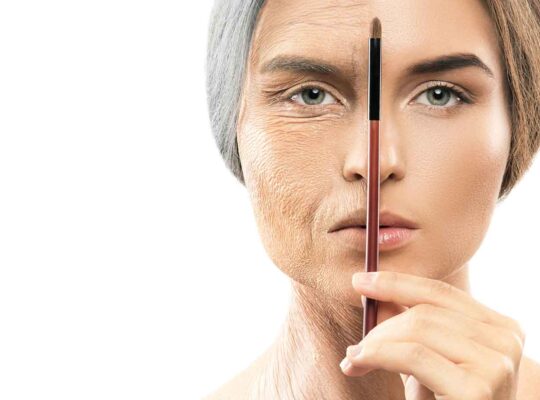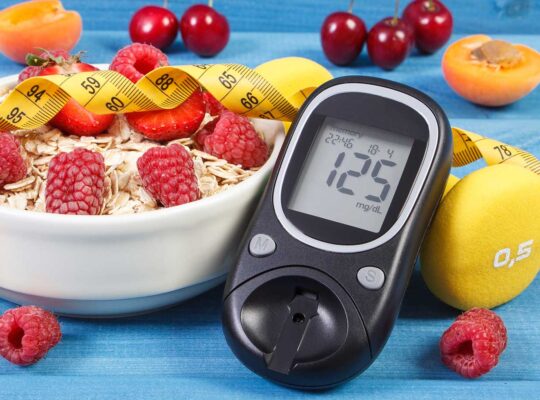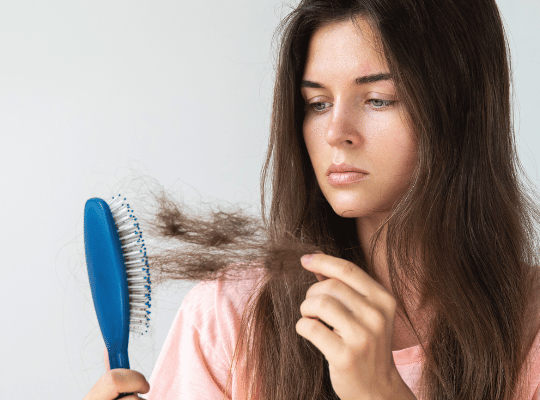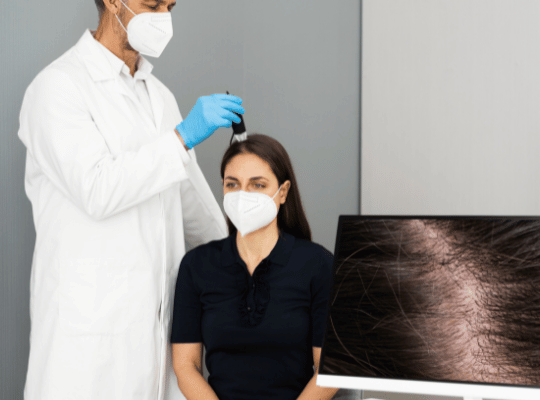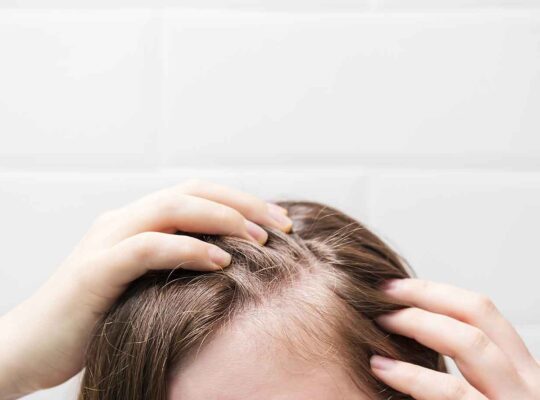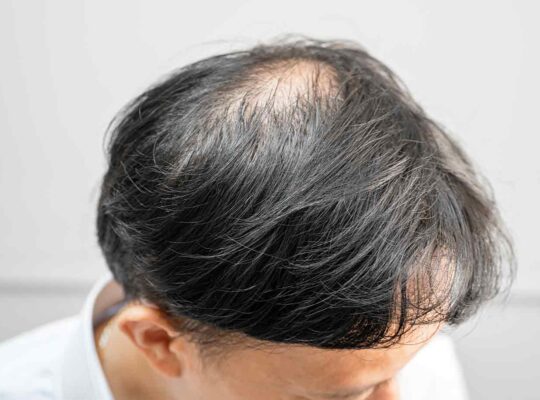Have you noticed more hair falling out after having your baby? If so, you’re not alone. Many new moms experience hair loss after pregnancy, which is also called postpartum hair loss. This can be surprising, especially if you enjoyed thicker hair during your pregnancy. In this article, we’ll explain what postpartum hair loss is, why it happens, and what you can do about it.
Understanding Postpartum Hair Loss
What Is Postpartum Hair Loss?
Postpartum hair loss, also known as telogen effluvium, is a temporary condition where new moms shed a lot of hair after giving birth. This usually starts a few months after delivery and can last for several months. While it might feel like you’re losing a lot of hair, this is a normal part of your body’s recovery after pregnancy.
Timing of Hair Loss After Pregnancy
Most women notice hair loss about three to four months after giving birth. During pregnancy, your hair stays in a growth phase longer than usual, so it seems thicker. After you give birth, hormone levels drop, and the hair that stayed in the growth phase moves to the shedding phase all at once. This sudden change is why it feels like you’re losing so much hair.
Normal Hair Growth Cycle vs. Postpartum Changes
To understand why postpartum hair loss happens, let’s look at how hair usually grows:
- Anagen (Growth Phase): This is when hair actively grows. It can last for 2-7 years.
- Catagen (Transition Phase): The growth slows down, and the hair follicle gets smaller. This phase lasts about 2-3 weeks.
- Telogen (Resting Phase): The hair takes a break for about 3 months, then falls out to make room for new growth.
During pregnancy, high hormone levels keep your hair in the growth phase longer. After the baby is born, hormone levels drop, and a lot of hair moves into the shedding phase, leading to noticeable hair loss.
Causes of Postpartum Hair Loss
Hormonal Changes During and After Pregnancy
The main cause of postpartum hair loss is the big hormonal changes that happen after you have a baby. When you’re pregnant, your body has high levels of estrogen, which keeps your hair in the growth phase. After childbirth, estrogen levels drop, causing your hair to shift to the shedding phase all at once. This is why your hair loss might seem sudden and intense.
Other Contributing Factors
In addition to hormonal changes, other things can make postpartum hair loss worse:
- Stress: The stress of giving birth and adjusting to life with a newborn can make hair loss worse.
- Nutrition: During and after pregnancy, your body needs a lot of nutrients. If you’re not getting enough, especially iron, it can lead to more hair loss.
Signs and Symptoms
Typical Patterns of Hair Loss
Postpartum hair loss usually happens in a few common ways:
- Overall Thinning: Instead of losing hair in one spot, you might notice your hair thinning all over your head.
- Clumps of Hair: You might see more hair coming out when you brush it or after washing it in the shower.
Distinguishing Postpartum Hair Loss from Other Types of Alopecia
It’s important to know that postpartum hair loss is different from other kinds of hair loss, like alopecia areata or androgenetic alopecia. Postpartum hair loss is temporary and directly related to pregnancy. If your hair loss continues for more than a year or you notice bald spots, you should talk to a doctor to make sure there isn’t another issue.
Coping Strategies
Emotional Impact and Self-Care Tips
Losing hair can be upsetting, especially when you’re already adjusting to being a new mom. Here’s how to cope:
- Be Kind to Yourself: Remember, postpartum hair loss is normal and temporary. It’s just your body adjusting after pregnancy.
- Take Time for Yourself: Even if it’s just a few minutes a day, do something you enjoy, like reading or taking a walk.
- Stay Positive: Your body is healing, and your hair will likely grow back. Focus on the positives and be patient.
Hairstyling and Cosmetic Solutions
While you’re waiting for your hair to grow back, you can try different hairstyles and products to make it look fuller:
- Shorter Hairstyles: A shorter haircut can make your hair look thicker and less noticeable if it’s thinning.
- Volumizing Products: Use shampoos and conditioners that add volume, which can help your hair look fuller.
- Hair Accessories: Scarves, headbands, or hats can be stylish ways to cover thinning areas.
Treatment Options
Natural Remedies and Lifestyle Changes
If you want to take a natural approach, there are some things you can do to help your hair grow back:
- Eat a Balanced Diet: Make sure you’re getting enough vitamins and minerals, like iron, zinc, and biotin, which are important for healthy hair.
- Be Gentle with Your Hair: Avoid harsh treatments like straightening or perming, and use a wide-tooth comb to reduce breakage.
- Manage Stress: Do activities that help you relax, like yoga, meditation, or deep breathing exercises.
Topical Treatments
Minoxidil is a treatment you can apply to your scalp to help with hair regrowth. Before using it, talk to your doctor, especially if you’re breastfeeding.
Nutritional Supplements and Vitamins
Taking nutritional supplements can support hair health, but it’s important to talk to your doctor first. Some commonly recommended vitamins include:
- Biotin: Helps strengthen hair and nails.
- Iron: Important if you’re low in iron after pregnancy, which is common.
- Omega-3 Fatty Acids: Supports scalp health and reduces inflammation.
Professional Treatments
If your hair loss is severe, you might consider professional treatments like Platelet-Rich Plasma (PRP) therapy. This treatment involves injecting your own blood plasma, which is rich in growth factors, into your scalp to help stimulate hair growth. This option is usually considered if other treatments haven’t worked.
Prevention and Long-Term Management
Maintaining Overall Health During Pregnancy
Taking care of your health during pregnancy can help prevent severe postpartum hair loss:
- Balanced Nutrition: Make sure you’re getting enough vitamins and minerals to support both you and your baby’s health.
- Regular Exercise: Staying active during pregnancy can improve blood flow, including to your scalp, which helps keep your hair healthy.
Postpartum Hair Care Routines
After your baby is born, a gentle hair care routine can help keep your hair healthy:
- Avoid Heat Styling: Try not to use hair dryers, straighteners, or curling irons too much, as they can stress your hair.
- Use Gentle Hair Products: Choose shampoos and conditioners that are gentle and designed for thinning hair.
When to Seek Medical Help
Signs That Hair Loss May Be Due to Other Underlying Conditions
While postpartum hair loss is usually temporary, sometimes it can be a sign of another condition. You should see a doctor if:
- Hair Loss Persists: If your hair loss continues beyond a year after giving birth.
- Bald Patches: If you notice bald spots or if your hair is falling out in clumps.
- Other Symptoms: If you have other symptoms like feeling tired all the time, gaining weight unexpectedly, or changes in your skin. These could be signs of thyroid problems or other health issues.
Importance of Consulting with a Healthcare Provider
If you’re worried about your hair loss, it’s a good idea to talk to your doctor. They can help figure out whether your hair loss is just from having a baby or if there’s something else going on.
Recovery Timeline
Typical Duration of Postpartum Hair Loss
Postpartum hair loss usually lasts for about six months to a year. During this time, you might notice more hair falling out, but eventually, your hair growth will go back to normal.
Expectations for Hair Regrowth
Hair regrowth after postpartum hair loss is different for everyone, but most women see their hair return to its pre-pregnancy fullness within a year. It’s important to be patient, as hair grows at an average rate of about half an inch per month. If you’re concerned, talk to your doctor—they can offer guidance and support.
Conclusion
Dealing with hair loss after pregnancy can be tough, but remember, it’s common and usually temporary. With time, care, and patience, your hair will likely return to its normal state. Focus on taking care of yourself and don’t hesitate to reach out to a healthcare provider if you have concerns. You’ve just gone through an incredible journey of bringing new life into the world—your hair will bounce back too!
FAQs
- Is postpartum hair loss permanent?
- No, postpartum hair loss is usually temporary, and your hair will likely grow back within a year.
- When does postpartum hair loss start?
- It typically begins three to four months after giving birth.
- Can stress make postpartum hair loss worse?
- Yes, stress can trigger or worsen postpartum hair loss.
- What can I do to prevent postpartum hair loss?
- Maintaining a healthy diet, managing stress, and gentle hair care can help reduce the severity of hair loss.
- Should I see a doctor if my hair is falling out after pregnancy?
- Yes, if your hair loss persists beyond a year or if you notice bald patches, it’s a good idea to consult with your healthcare provider.


